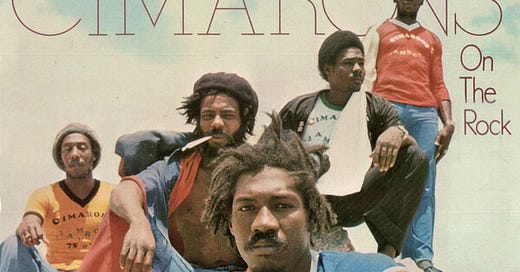REGGAE’S GOLDEN AGE (REVISITED)
A feature length documentary on Brit reggae band Cimarons and two nonfiction tomes on reggae’s heyday arrive for autumn.
On The Rock was Cimarons’ 1976 album. A doc’ argues that its a major achievement for British reggae.
I love Jamaican music. That said, I should note “roughly from 1960 to 1990” – in the last 30 years+ its rare for new Jamaican music to have held my attention: JA pop-reggae artists from Shaggy and Sean Paul through Chronixx and Popcaan have all released entertaining (if rarely memorable) records. Indeed, the Jamaican music that continues to enthral the world was mostly recorded between 1964 – 1978: by then the breakthrough artists had done their best work (including Jimmy, Bob, Toots, Horace, Gregory, Spear and Dennis) while Lee “Scratch” Perry and King Tubby were walking away from being at the forefront of studio wizardry. Dancehall’s blunt chat ‘n’ beats would prove to be the local sound most Jamaicans listened to: while Shabba Ranks, Yellowman and other dancehall stars did make an initial international impression, their popularity (and music) never developed.
Which means that the enduring popularity of “golden age” Jamaican music ensures original vinyl pressings keep inflating in price, reissues are repackaged over and over, while books and films pour forth. Actually, I’m overstating my final point: not that many books or films – it appears Bob Marley is the only Jamaican artist whose name can guarantee bums-on-cinema-seats/serious book quantities shifted – but, as a niche genre, reggae certainly gets more love today than vintage blues, jazz or soul.
So to two books – one new, one a new edition – and a documentary feature, all focused on the golden era when Jamaican musicians, both at home and in Britain, made music that resonated.
HARDER THAN THE ROCK
Mark Warmington (director)
My last post was on Kris Kristofferson so its appropriate I begin this one with British reggae band Cimarons, whose career has stretched over a similar time span to the late Texan’s. Yet the band stand in stark contrast to KK: they enjoyed almost no taste of fame and fortune. Cimarons were respected in the reggae community, worked hard from 1967 into the mid-1980s, yet never won much of an audience. They struggled on individually – as Kristofferson did once his 70s fame faded – and the group have reformed in recent years, but its a new documentary film that will surely give them more recognition than anything else in the past 57 years.
Harder Than The Rock, a feature length documentary about Cimarons, was released in selected British cinemas this weekend. It follows in the tradition of Getting It Back: The Story Of Cymande and Searching For Sugarman (to name two successful music doc’s that celebrated overlooked artists) and director, Mark Warmington, will be hoping it can follow the aforementioned features lead in attracting many viewers who were previously unaware of their unsung musicians.
Me being me means I’ve long known of Cimarons – I even own a couple of their 45s on Vulcan (one is a version of Wicky Wacky, the Fatback Band funk anthem: its not impressive) – but, admittedly, I didn’t know much about the actual band. So by watching HTTR I did learn how five Jamaican-born youths came together as teenagers in Harlesden, north London, in 1967 and formed a band. They succeeded in doing this and were soon employed to back visiting Jamaican vocalists, including Bob Marley when he, pre-fame, played a series of UK dates with Johnny Nash in 1972. They also backed John Holt in the studio so its likely Cimarons playing behind Holt on his hit version of Help Me Make It Through The Night – see, I knew there would be a Kristofferson connection!
The Cimarons also released their own records on small British labels, including Trojan, Lee Gopthal’s pioneering label that did so much to launch reggae in the UK. In the 1980s, like many other bands, they desperately tried to make their sound more pop radio friendly. When this failed they disbanded. Only to reform – like so many old bands - decades later.
The hook here is Cimarons were the “first” British reggae band (The Pyramids, whose dynamic set at Skabour Festival in Folkestone I reported on a few weeks back, might disagree) and were unjustly ignored at the time. A similar angle was worked in the Cymande film (they being funk, rather than reggae): British radio and print media back then tending to ignore Black British artists (and West Indian and African), only giving token nods to Black US stars (racism/inverse snobbery: the empire mentality being “nothing from the colonies could be any match for UK music – except US”).
This noted, Cymande were a far more original band than Cimarons, their music still sounding fresh and having inspired many rap producers. While Cimarons were, at best, reggae journeymen: listening on Spotify it appears they covered lots of contemporary US soul/funk hits – including Kung Fu Fighting. As with Wicky Wacky, their take on Carl Douglas’ mega-hit – Douglas is also Jamaican British - lacks imagination.
JA smoothie John Holt singing Kris Kristofferson’s ode to gentle love making. I believe its Cimarons playing behind him. This jaunty tune - I prefer Gladys Knight’s more soulful take - got to No 6 in the UK charts in December 1974 and likely increased the population!
The best thing about HTTR is Locksley Gichie, guitarist in the Cimarons and a warm, likeable guide to their story. Just as Wilco Johnson’s imposing presence in Oil City Confidential (the pretentious doc’ on pub rockers Dr Feelgood) led to him winning acting work, I can see Gichie also turning up in future TV series. His other band members aren’t anywhere near as engaging and the director relies far too much on talking heads – including journalists and collectors – to parrot on about how “great” the band were.




